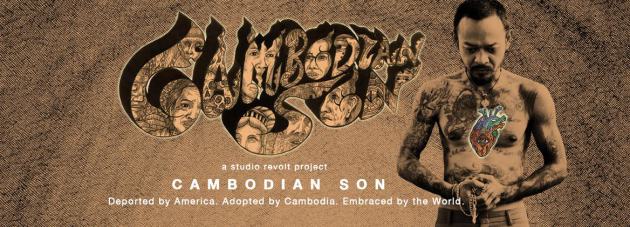
DEPORTED TO THE TWIN CITIES.
TUESDAY // APRIL 15, 2014 // 7-9 PM
HAMLINE UNIVERSITY-KLAS CENTER (3RD FL)
1537 TAYLOR AVENUE
SAINT PAUL, MN 55104
From the website: Cambodian Son documents the life of deported poet, Kosal Khiev after receiving the most important performance invitation of his career—to represent the Kingdom of Cambodia at the London 2012 Cultural Olympiad. Kosal would travel to London having only taken two flights prior; first, as a 1-year-old refugee child whose family fled Cambodia and, then as a 32-year-old criminal “alien” forcibly returned to Cambodia in 2011. The film follows a volatile yet charming and talented young man who struggles to find his footing amongst a new freedom that was granted only through his deportation. Kosal’s London representation is a triumphant moment for many people in his life, both in America and Cambodia. The film traces the impact and significance of this moment for Kosal, his friends, family, mentors and a growing international fan base. Armed only with memorized verses, he must face the challenges of being a deportee while navigating his new fame as Phnom Penh’s premiere poet. After the performances end and the London stage becomes a faint memory, Kosal is once again left alone to answer the central question in his life: “How do you survive when you belong nowhere?
I was able to exchange some emails with Anida Yoeu Ali of Studio Revolt about the film, in anticipation of the premier here in Minnesota on April 15.
1) What drew you to Kosal Khiev and this project?
Masahiro (director) and I were introduced to Kosal by a mutual friend, another Khmer Exiled American (KEA) I knew in the US. Our mutual friend raved about Kosal’s poetry and said that we should really meet him, especially since I was also a spoken word artist once upon a time in Asian America. (Masa’s personal telling about his first encounter with Kosal is very touching, so feel free to read it here:
Then one night Masa comes home and tells me that he just heard Kosal’s life story in one sitting. He was moved by the whole experience and he said this guy has something special and that I should really take the time to hear him kick a poem. Being the jaded old school spoken word artist that I was, I didn’t really believe Masa but then I remembered that Masa doesn’t usually rave about spoken word poetry so Kosal must have moved him deeply. On another night, Kosal came to visit us and in the middle of my living room I asked if he would kick a poem. That poem was “Moments In Between the Nights” and it grabbed my guts and shook me teary eyed. Since that moment sometime in July 2011, our paths have intertwined into both a journey and collaboration.
We believe Kosal represents something bigger than himself – ideas around compassion, the transformational power of art, and justice.
2) As it is National Poetry Month, what is it about poetry and spoken word that makes it a useful vessel for such a heavy subject?
Spoken word woven with musicality, theatricality and the raw energy and charisma of Kosal offers an element of entertainment that enables a mainstream audience typically unsympathetic to the deportation of convicted felons to have a new guide into the issue.
Kosal has a voice and it’s powerful and inspirational. We truly believe that his story and poetry should be heard on an international scale. We believe he has the power to unite and open up minds and hearts. He became a reformed man inside the US prison system as a result of arts programming. This means that reform is possible and art can be transformative. Kosal is living proof. We don’t need more punitive forms of justice but rather options that are restorative and transformative.
3) What is the goal of this film?
Our goal is to reach millions with this film. Laws can only be changed if we can change the culture which created the policies. We want people to humanize the issue of deportation through Kosal’s story. We want people to experience his story in order to tap into compassion and a sense of justice. Kosal’s story is complicated and has everything to do with history, geo-politics, war, circumstances, and failed systems which created him, then destroyed his life, and now rebirthing him once again.
4) Where can readers learn more about deportation?
Please read the “issues” section of our press kit and/or our movie’s website for this information:
http://cambodianson.com/about/issues/
Trailer:
https://www.youtube.com/watch?v=EHiUw0v8YSs&feature=youtu.be

1 comment:
The whole truth is:
Adopted by America, broke the rules and bite the hands of the adopted country, deported by the adopted host.
Adopted by Cambodia and learn the hard way in self reliance Cambodia. Every person always finds way(s) to adjust. He grew up in America, leanr American ways of life but he will spend the half part of his life in Cambodia to learn Cambodia ways of life. Learning is never ending process.
Post a Comment